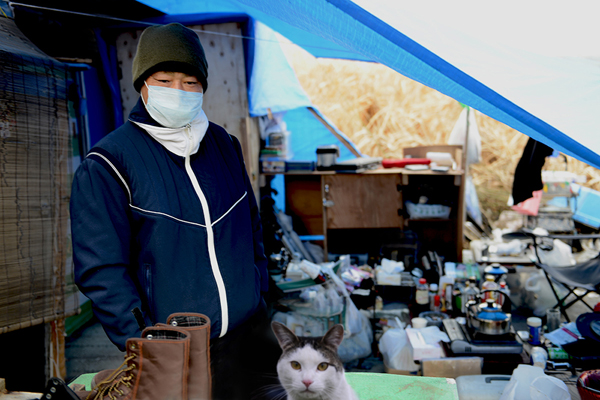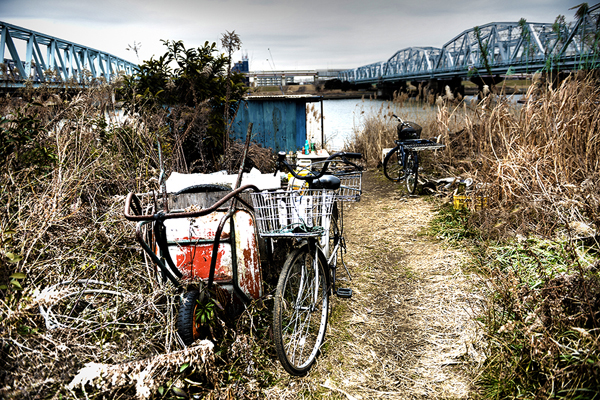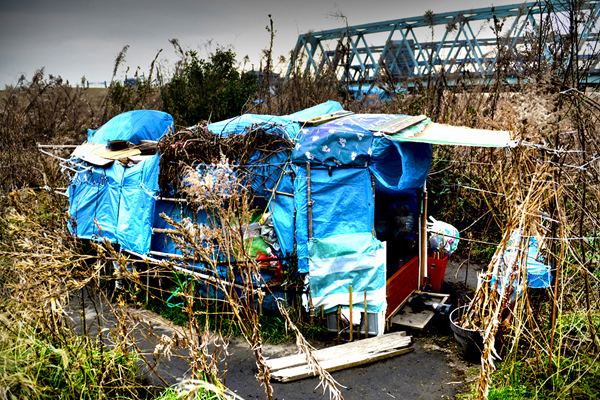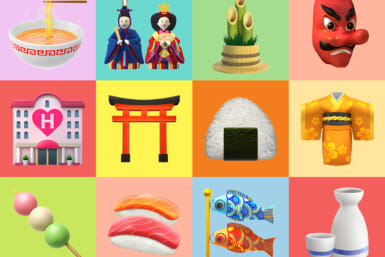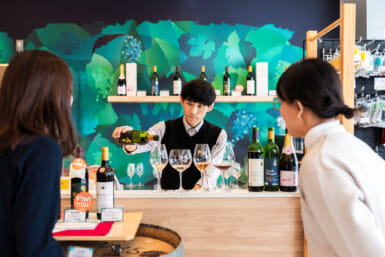The blue sheet shanty towns that fill gaps all around Tokyo – under train tracks, beside highways and on the riverbanks – hold more than perhaps first meets the eye.
by Stack Jones
I received an email last Friday from Ric O’Barry simply stating, “I’m on a plane heading to Tokyo. Call when I get there.”
Ric is a man of few words but as many of us know he works tirelessly for an important cause. As he likes to put it, “If we can’t protect the environment of an important species like the dolphin, then we can’t protect ourselves.” While some might say this is a doom and gloom approach to a possible future scenario that we all will face, Ric remains optimistic. “We can do this, it’s not difficult. We just have to care.”
Ric was on his way to Japan to work on his next project. A concert that could end up being larger than the Rolling Coconut Review, which took place in April of 1977. RCR was the first concert to have Japanese and western superstars performing on stage together. At that time Japanese acts were relegated to the opening slot.
The RCR was a benefit concert for Japan Celebrates the Whale, organized by Ric. The concert featured Jackson Browne, John Sebastian, Richie Havens, Odetta, Warren Zevon, Eric Andersen, Lonnie Mack, Japanese folk singer and actor Izumiya Shigeru, and a jazz-funk band with keyboardist Richard Tee, drummer Steve Gadd, guitarist Eric Gale, guitarist Cornell Dupree and bassist Gordon Edwards.
What people didn’t know about that concert was Japanese products were being boycotted and Japanese abroad were getting beaten as a result of the boycott. Ric stepped in to stop the violence aimed at the Japanese.
By now you’re probably starting to wonder how all of this relates to an article titled Takashi and Maru. OK, fair enough!
While heading to Shinjuku to meet Ric, I passed Minami Senju, as I have done so many times before. I always look out across the Arakawa River to get a glimpse of the ever expanding, ‘blue-tarp’ homeless community that exists right there on the river. I also notice that many Japanese never notice, or pretend not to notice. Today, armed with two cameras, I decided that I would be going there after meeting Ric.
The Arakawa River sits between Kita Senju and Minami Senju. Most people in that region pass over the river on either the TX Line or the Hibiya Line, with the homeless shantytown in full view. Often, people going towards Kita Senju will be on their way to Disneyland, “The happiest place on earth.”
At the end of my interview with Ric, I made my way back to the river. I got off the Hibiya Line at Minami Senju and walked toward the Arakawa River, which was actually a lot further than I thought.
I finally came across a huge wall with fences and steep hills that obscured the location. I climbed the steep hill to get a bearing on where I was and there it was, right before me. I stood there for a few minutes, taking it all in as endless trains passed overhead. It wouldn’t be long before the sun would set, so I had to hurry.
The first thing I noticed was a huge pile of trash, neatly and properly broken down in the myriad of categories the Japanese government expects. Then, I realized that these invisible people took the effort and expense to properly store their debris, yet the government hadn’t bothered to take the time to haul it away.
Then I noticed a bicycle- or foot-path leading to the makeshift homes. It was clear of debris. I took that path and quickly found myself surrounded by several blue tarpaulin sites that looked more like camps than homes. Most were very clean and organized. Some were very sophisticated with solar lights, radios, sleeping areas, furnishings and areas to sit, relax and eat. There was even a smoking area.
It was especially touching for me to see how these people adapted to their surroundings, because when I was in law school I lived in San Diego but commuted to San Bernardino to attend classes. The commute was five hours in normal traffic – impossible if it was backed up. I often stayed late into the evening studying at the library and was often the last person to leave. I drove a truck, and decided to purchase the equipment necessary to sleep in the back of it. There was a YMCA gym very close to the school which was perfect for working out, and showering.
Fortunately, my traveling lifestyle made this arrangement quite easy for me to adapt to. I survived the California wildfires and their gray ash that snowed on me for several days, a few real snow falls, rain, bitterly cold winter nights and even a late night truck-jacking attempt by gang members wearing hats and hoods that covered their faces. (I held up my cell phone pretending it was a gun. Luckily for me, I didn’t accidentally hit one of the buttons that would have lit up the phone and revealed its true purpose. The criminal miscreants bought the act and moved on.)
As I made my way through the shantytown I quickly found myself at the river’s edge. Here, there was an impressive array of fishing poles and everything else one would need to fish. I noticed that the river was very polluted. This was not the result of the people who lived at the camp. This is what I have come to understand as Japan’s incredible indifference toward rivers and oceans. One of my earliest memories of Japan is how shocked I was when I went to the beach for the first time and saw more trash than in any third world countries I have ever visited. Little wonder Ric O’Barry has great difficulty educating Japan regarding mercury contamination, lead, pesticides, herbicides, coal fire plants, dioxin and other toxins that are wreaking havoc throughout the region and the world.
Oddly, nobody appeared to be “home”. Then, I suddenly stumbled upon a man sitting at a table at his site. At first, I backed away, not wanting to disturb him. Then, I thought, this is what you came here for: to discover who these people are. I gathered myself and returned to the place where that man was sitting, having no concept as to how I would be received.
As I approached, I said, “Konichiwa.” A well-fed cat jumped up on a table and greeted me. The cat was healthy, and quite friendly. He stayed at my side for quite some time, purring and seeking affection. I used the cat encounter as a means to begin conversing with the man, who had kind eyes and a ready smile. I would come to know him as Takashi. The cat was Maru. Takashi and Maru.
I noticed that Takashi had a genkan, and that his boots were free of any mud or debris. I noticed that his clothes were clean, his hair trimmed short, and he was freshly shaved. I asked if I could take a photo of Maru. “Of course.”
Takashi offered me a chair. His best one! I sat down. We talked briefly and I offered him some money for allowing me to take photos. He staunchly refused. Could I buy him a beer? Takashi said he didn’t drink so much, and it was quite clear he hadn’t been drinking at all that day. He looked healthy and he was mentally and physically fit.
I told him I was thirsty and wanted to go get a drink. I asked him what was his favorite drink. He politely replied, “nan demo,” which means anything’s OK…
I headed over the steep wall and toward Senju, which has a brand new and very nice shopping area. I got some beer and went to a trendy Chinese noodle shop. As usual, I couldn’t understand a damn thing on the menu let alone figure out how to use the machine to purchase it, so I asked the employee what her favorite noodles were. She pointed to something and I said, “OK, two take-out orders, please.”
While I waited for the noodles, I picked up some Krispy Kreme doughnuts and a piece of KFC chicken for Maru.
I got back to the steep hill and discovered a high school student taking photos of the shantytown. I invited him to come and get a closer look. He replied, “Abunai”, which means dangerous. I laughed and headed down the hill toward Takashi’s home and gestured, “C’mon!” To my surprise, the kid followed and told me his name was Daisuke.
We approached Takashi’s camp and I shouted, “Konbanwa!” Takashi responded and so did Maru. Daisuke introduced himself, while I took off the breading of the chicken and gave the meat to Maru. Maru happily ate it – and then took off – and I didn’t see him again for the entire evening. Typical cat! I wondered how many lives he still had left?
I offered Daisuke a doughnut and he accepted. I asked if he wanted a beer. He didn’t readily accept! We all laughed at that. I handed Takashi a beer (I had purchased four) and he bowed with his hands together, which is always an uncomfortable feeling for a foreigner. Especially, for an intruder, oh dear reader, which I recognized myself to be. I gave Takashi noodles and we both ate. We both said, “oishii” a dozen times; those noodles were really good! I finished my noodles and my beer before Takashi. I’m sure I was hungrier.
I then ate a doughnut and opened a second beer. Takashi had barely drunk from his, but he had finished the noodles. Daisuke, having a good look, up close and personal, had probably had enough and politely bowed out.
Takashi had a cell phone and he showed me a photo of Maru when he was a kitten. The picture was perfectly cropped and adorable. He obviously loved Maru and it was apparent Maru shared the same affection toward him.
I learned Takashi had lived on the river for three years now. I asked him how he ended up there. I couldn’t understand all that he said, but he used to be a truck driver and somehow lost his license.
How does he currently earn a living. He said he collects electronic goods and aluminum and makes pretty good money. He had a cell phone, his camp was stocked with solar lights, radios and a sturdy wood closet he’d built, which locked and was where he stored his valuables. He also had a comfortable place to sleep that was water tight and that he had designed and built himself.
I asked how he washed and he said he goes to the public bath house and pays ¥400 to bathe. (Which I think is pretty expensive). He’s 52 and has two children. His daughter is 19, his son is 28.
Do they know where he is? There was silence at this question and I could see he was holding back an emotional flood. I stopped prodding into this man’s personal life and felt like a jerk for pushing too hard and intruding.
His children don’t know where he is, as, in Japan’s unforgiving culture, he lost his job and had no income, so his only option was to leave home. A self-imposed exile.
During the entire conversation, trains rolled overhead. Again, and again, and again and again and… It was now getting dark, but the lights from the trains lit up the campsite and were actually very attractive. They also lit up the river, which shone and shimmered in red, yellow and gold. The sound of the endless train of trains and their metal wheels on the metal tracks beat out a steady rhythm. Honestly, it felt as if I had been on holiday and was camping at Waipio Valley on the Big Island of Hawaii, or on the Baja in Mexico.
I asked Takashi what time he went to bed, he said usually around 7 or 8pm. I said I like surfing, writing and photography. He still didn’t understand but I wanted to know his hobbies. I then gestured that I played the guitar. Takashi understood and said he likes to go fishing. I asked if he liked river fishing or ocean fishing. He said both. I said, pointing to the river, “How about fishing here?”
Takashi said there are huge “Chinese” fish (I can’t remember the name), each about four feet long and easy to catch with bamboo poles. He showed me the bait he uses. I asked if he ate the fish he caught. He said no, as the river was too polluted. August is the best time to catch them, he said.
An elderly man suddenly appeared and just as quickly disappeared when he saw Takashi had a “guest”. That was Grandfather. I learned that his son had committed suicide a few years back – a work related death – and that Grandfather had no place to go as he believed he was now a burden to the rest of his surviving family. So, he made his way to the river one day and started to piece together his own blue, plastic-tarp river-front existence. Takashi said Grandfather refused to let anyone help him build it. He never intended to be a burden to anyone again.
So, Grandfather went to the river, as many have done before him, and surely will after. At Grandfather’s age, he should be enjoying his final years in the security he was taught to believe in by the society that now rejected him, and which he rejected. Instead of having that security, Grandfather had to start a new one. The kind of life all Japanese people fear and shudder to think about. Even to the point where they act as if it doesn’t exist.
I thought about my five-year relationship with my girlfriend, who is very dear to me. I thought about all the thousands of times she has asked me, ‘if we got married, could I protect her, could I give her security?’ Thinking about Grandfather, I wondered if anyone could answer that question in the affirmative and be honest in doing so.
Takashi suddenly excused himself, and as he did, I realized that it was getting close to 7pm. I thought I should probably get going. Takashi quickly returned and to my surprise offered me a gift. He said, “because you are a photographer, you can use this to put photos in.” It was a brand new photo display that would light up a photo beautifully. I knew that he was offering it to me in exchange for dinner. What Takashi didn’t realize was that he had already given me a life-long gift, and that it had more value than anything tangible. I knew that I would never again be able to pass over the Arakawa River and not think about Takashi, Maru, and especially Grandfather.
The public image of men like Takashi is that they are drunkards. Takashi barely drank the beer I gave him. The public image is that these people are insane, dangerous, outcasts, misfits, degenerates, low-life and deserving of their plight. Clearly, his eyes are kind and he was generous to put up with an uninvited intruder and answer personal questions that I myself might have refused.
I personally don’t believe in the dyslexic dog we call god, but I shudder to think of the millions and millions of people that go to shrines, churches and temples and pray to their grandfathers and grandmothers who have passed away, in the Shinto and Buddhist tradition, but laugh at, mock and ridicule people like Grandfather and Takashi.
I said I should probably get going. We stood. I called out for Maru, but he was having none of it. Takashi laughed. He bowed and thanked me. I walked over to him and said, let’s do it American style. I hugged him and he hugged me too. We patted each other on the back and looked closely at each other’s faces as the train passed by overhead. We smiled, and I promised to return to to go fishing with him. Takashi said he would like that.
Takashi’s solar light began to dim so I grabbed my camera bag, said goodbye, and made my way back to the train station. But, not before stopping and turning around and taking in the sounds, images, and smells of the camps that were huddled in the darkness, with their dim lights shining within and the river glimmering from the passing trains crammed full with workers who didn’t even have enough space to sit.
I laughed, but I wanted to cry, realizing some of those people hate and fear the likes of Takashi and Grandfather. Hate, because their “way” issomething that society has taught them to shun. In reality, society has taught them the hard lesson of circumventing true freedom. Fear, because everything down there, at the bottom of that hill, and on the river, in that dark and dimly lit blue plastic tarp town is the possibility of an unknown future for us all. While the endless cattle-car society turns that alternative into something shadowy, degrading, reprehensible and horrific.
How can I ever pass over the Arakawa River without thinking about Takashi, Maru, and Grandfather? When will I do return? In August? Next week? I want to meet Grandfather. I want to see his face and listen to him speak about his life.
The train was packed solid as I returned home. I stood in the crowd, taking in foul smelling winter coats that had been in countless smoky bars and restaurants. I saw the empty faces, all staring at an endless array of electronic devices. There wasn’t a sound, except that of the train wheels, clicking out the same rhythm I heard while in conversation with Takashi.
Upon returning home, I immediately contacted my friend Dr. Ebihara. I told him that he must return to the river with me. I told him he must check on the health of Grandfather. Dr. Ebihara, who is a wealthy, prominent and successful owner of a rather large clinic, said he often goes to Senju to stand at the bar and drink with the people there. He said it is one of his greatest joys.
Apparently, I still have much to learn about Japan.
Photography and text by Stack Jones

